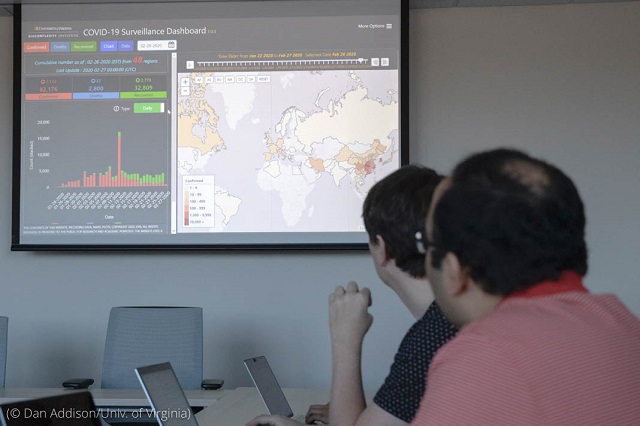Researchers from the University of Virginia’s Biocomplexity Institute have won a $10 million, five-year computing grant from the U.S. government’s National Science Foundation in order to map cases of the new coronavirus and anticipate how communities will be affected.
The institute’s researchers develop technologies to help officials manage public health crises. Madhav Marathe, a division director at the institute and a professor of computer science, is leading the new project.
Under the grant, the institute’s computer scientists and epidemiologists will lead teams from several other institutions using big-data computing tools. Such data allows experts to see how human behaviors affect the spread of disease.
Building simulations to predict needs
To study cities or even countries, the University of Virginia researchers first create a place’s digital “twin,” similar to the way video game players use the popular game SimCity. But the computer scientists’ creations accurately mirror each area’s specific infrastructure, demographics and centers of living, shopping and working.

Biocomplexity Institute researchers trace the path of COVID-19. (© Dan Addison/University of Virginia)
According to Marathe, the simulations can capture “how disease might spread … from a few infections” and offer various outcomes based on differing behaviors, such as social distancing.
Battling COVID-19
Marathe and his colleagues already have forecast the likely number of COVID-19 cases for every county in the United States. They will continue to update their forecasts in order to predict the need for resources such as ventilators and intensive care unit (ICU) beds.
At the request of U.S. federal agencies, the institute also is performing computations for Italy, Germany, France and Poland to gain a better understanding of COVID-19 dynamics.
The grant will allow these researchers to collaborate with experts at Princeton University to understand lessons learned in Wuhan and New York. The researchers will also work with University of Maryland professors to investigate how best to share resources — such as ventilators — and where to locate new field hospitals.
The researchers will use a crowdsourcing app in conjunction with Stanford University to collect information on countries’ social-distancing measures in order to better model the growth or reduction in COVID-19 infections.
The grant gives researchers at the University of Virginia a leading role as they collaborate with their counterparts at Arizona State University, the Center for Disease Dynamics, Economics & Policy, Indiana University, Lawrence Livermore National Laboratory, Massachusetts Institute of Technology, Oak Ridge National Laboratory, Princeton University, Stanford University, the State University of New York at Albany, the University of Maryland, Virginia Tech University and Yale University.
Banner image: Computer scientist Madhav Marathe leads a team at the University of Virginia's Biocomplexity Institute. (© Dan Addison/University of Virginia)







COMMENTS0
LEAVE A COMMENT
TOP